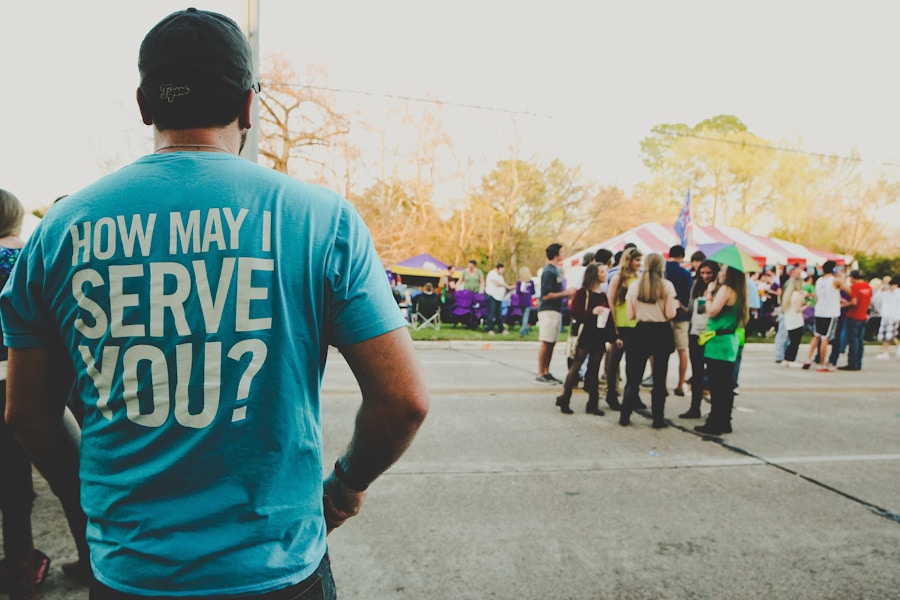 Excerpt from Spiritual Disciplines Handbook
Excerpt from Spiritual Disciplines Handbook
Many Americans spend their lives working themselves into a place where they can he served more than serve. As the saying goes: “It’s good to be queen [or king]!” Our culture sees the blessed ones as those who gel waited on and served. And few among us aspire to be the maid with the job of serving and blessing others.
In Genesis 18:18 the Lord says, “Abraham will surely become a great and powerful nation, and all nations on earth will be blessed through him.” God’s trajectory is to bless the earth through his people. And to show them exactly what he has in mind, he comes to earth as one who serves (Luke 22:27). Jesus is God with us. And he calls us to serve (Matthew 22:37 – 39). This is not religious rhetoric that we simply endorse as a good rule of thumb. The Christian discipline of service is the way the world discovers the love of God. We are the way God blesses the earth.
Jesus’ attention to the blessing God intended to bring to the nations never wavered. When he finds the temple in Jerusalem clogged with buying and selling, he takes the whole religious establishment to task — running them out of the temple with a whip of cords. God’s people were to be a blessing; his temple was not supposed to be a place of business but “a house of prayer for all nations” (Mark 11:17). God intends to bless the nations through us and our lives of service. Christians are the very presence of God to others. We become God’s vehicle of blessing on planet earth.
We will never really serve others unless we see that the needs of our neighbors are as real and important as our own. This may seem obvious. But the truth of the matter is many of us look right through others and never see them, let alone care about what they need. When we are preoccupied with our own concerns, much of the world is simply invisible to us. Service is rooted in seeing—in seeing others as God does. God cares about productive and nonproductive people, poor people and rich people, educated and noneducated people. God cares about everybody. And if we harbor hatred that breeds neglect of any of God’s people, we are hindering the Spirit of Jesus. The Spirit of Jesus is a compassionate, serving Spirit that always works for the good of others. Jesus maintains that radical love for others demonstrates whether we know God or not.
Martin Luther King Jr. said, “Everybody can be great because anybody can serve. You don’t have to have a college degree to serve. You don’t have to make your subject and verb agree to serve. You only need a heart full of grace, a soul generated by love.” It is enough to make a truly great difference in someone’s life.
Reflection Questions
- What is it like to be loved by someone as he or she loves him- or herself?
- Do you like to be served or to serve? How docs this affect the way you live?
- When do you live out of an entitlement mentality rather than love of neighbor?
Spiritual Exercises
- Every morning for the next two weeks ask your spouse, roommate or a colleague, “What can I do for you today?” Then do it. • Talk to God about what this is like for you. What do you sec about yourself?
- Develop a yearly practice of involving yourself in one intentional service, mission or relic! project. Consider which type of project speaks to some of the longings of your own heart.
- Divide a paper into three columns. Above one column write, “For Me.” Above the second column write, “For Others.” Above the third column write, “For God.” Review the past week or month. Jot down in each column the things you have bought and done for yourself, others and God. What does this inventory reveal about your life? • Take time to read Luke 23. Gaze at Jesus on the cross. What has God given because he loves you? • How would you like to sec the answers in your columns change over the next months? Listen to your longings and God’s promptings.
- Spend some time meditating on the story of the good Samaritan found in Luke 10:25 – 37. Become quiet and ask the Lord to speak to you. Give your imagination to God. Read the slowly story and aloud, savoring the words. • What stood out to you? • Read the passage a second time, imagining you are the Levite. What are your concerns? Why are you in a hurry? • Then put yourself in the place of the priest. What are your concerns? Why do you pass by? • Imagine you are the Samaritan. Why do you stop to help? I low do you feel about incurring all the expenses for another’s care? • Who of these three characters do you tend to be like? • Who in your life receives your care: family? friends? Who else?
- Sign on to set up or take down an event. This part of event planning is the least sought after. • What is it like for you to do a simple task that doesn’t require your skill or expertise? What does this tell you about your acts of service?
- Ask those who know you to give you their take on what your spiritual gifts are. Plan a way of using your gifts to benefit others in the next week and month.
- Get to know some missionaries or a faith-based organization. Find out what they need.
Taken from Spiritual Disciplines Handbook by Adele Ahlberg Calhoun. ©2015 by Adele Ahlberg Calhoun. Used by permission of InterVarsity Press, P.O. Box 1400, Downers Grove IL 60515 – 1426. www.ivpress.com
Text First Published October 2005


